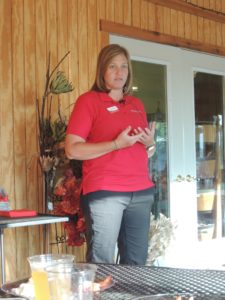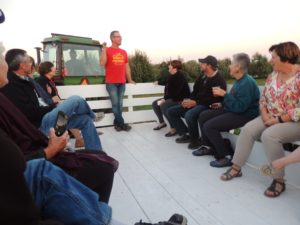More than a dozen adults checked out what “4-H for grown-ups” looks like last Thursday at Deal’s Orchard. Part of the Greene Living series, Greene Plate explored local foods, with a focus on growing apples and hops. Like most 4-H meetings, the evening included food, education, and a fun activity.
The evening began with heavy hors d’oeuvres prepared by Hy-Vee and complimentary tasting of Deal’s hard cider. Speaker was Dr Diana Cochran, professor of horticulture at Iowa State University.

Cochran has first-hand experience growing hops. She said Iowa is not the ideal climate for growing hops, but some producers are able to. She recommends people do very careful research before planting hops (hops grow from rhizomes or cuttings, not seeds) because of the high start-up and input costs. Inputs can be as high as $12,000 to $15,000 per acre.
Hops are trellised and can grow up to 18 feet. Cochran said she has seen them used to provide shade for a porch, and then they’re cut down at the end of the summer.
The discussion of apples, cider and the impact of hard cider on the apple industry was lively, with attendees asking questions freely.
The Deals aren’t following the same path as commercial hard cider producers, as they’re using “dessert” varieties- the same varieties the Deal family has grown for decades. The “English” varieties grown for hard cider are bitter, Cochran said, almost like crab apples, and she’s uncertain if they would grow well in Iowa.
Most attendees were surprised to learn that Deal’s regular cider is not a consistent product throughout the season. The summer varieties are more tart than later varieties, and as the season progresses, the Deals blend tart and sweet varieties “to taste,” much like a chef adds seasoning. But, in general, the cider is a bit sweeter later in the season.
Attendees were happy to hear that the Deals are expecting a very good crop this year. Jerald Deal said that barring a harsh wind storm or early freeze, they hope to pick into November. He thinks they’ll have apples in cold storage to sell retail through March, and perhaps apples to keep pressing for cider until next summer.

Benji Deal, the eldest son of Jerald and Cindy Deal and the person behind the hard cider business, said they’re looking for a harvest of 16,000 to 18,000 bushels. For comparison, the orchard harvested only 6,000 to 7,000 bushels last year.
4-H meetings generally include some sort of activity, and grown-up 4-H did, too. After Cochran’s discussion, people boarded a new hay rack for an evening tour of the orchard. Jerald Deal was happy to show the wheelchair lift on the wagon, another new feature this fall.
Upcoming events in the Greene Living series include Wine and Cheese 101 on October 19, cooking for the holidays, avoiding holiday stress, and healthy eating. To register please call Greene County Extension at 515-386-2138, email xgreene@iastate.edu, or visit the office at 104 W. Washington St in Jefferson.
